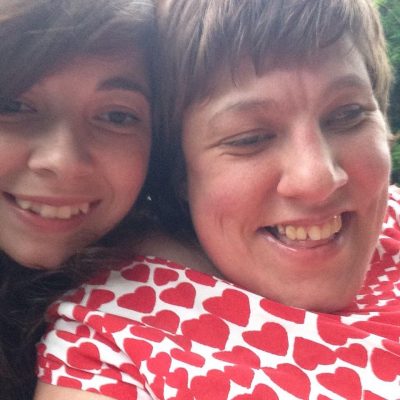Beyond Awareness (Ros' Blog)

So, here I sit in the office on 6th April, thankfully alone for the moment, wearing my onesie. Yes, it’s Onesie Wednesday in “Autism Awareness Month” and, never one to miss an opportunity, I decided to get people to sponsor me to wear a onesie as I drive down the A3 and back, and all day in the office. The sponsorship money is going to our Churches Inc. programme, which provides training for churches in how they can enable autistic and disabled people to belong fully and play their God-intended part in the life of the Church.
(The picture shows two of Ros’s daughters sharing a sisterly moment).
Does this mean that Through the Roof supports Autism Awareness Month? Not really. Primarily it means I’m an unashamed opportunist when it comes to raising funds for Through the Roof. Perhaps you’re already aware of it, or perhaps not, but there’s a lot of controversy surrounding Autism Awareness Month.
For one thing, autistic people have had enough of being stereotyped, pigeonholed, marginalised and patronised. Having lived with my autistic daughter for 32 years, I know that the stereotypes are very wide of the mark, and I understand the frustration of people being typecast in this way. My daughter is one of the most empathetic, caring people I have ever met. She isn’t especially virtuous. She doesn’t fit any of the stereotypes. For another thing, putting the spotlight for a month on people who naturally shy away from it may border on abuse. And what autistic people are telling us they want is not “awareness” but acceptance and affirmation (the same as we all want); certainly not strategies and “treatments” that focus on changing them, but societal adjustments that enable them to bring their personalities and strengths to bear on the communities in which they find themselves, so that all of us can benefit from the part they play in our lives.
After all, Jesus never gave anyone the message “you’re not acceptable the way you are”, but welcomed everyone exactly as God made them. Autistic people, as I keep being reminded by another of my daughters, do not have a “problem with communication”. They communicate very competently in a “language” that most of us have not bothered to try and learn. It’s we who have the problem in understanding. Ann Memmott makes a strong case that Jesus may have had an autistic disciple, as described in John’s Gospel: follow this link to read Ann's article.
Through the Roof is not political in any way, whether with a capital P or a small p and we shy away from getting involved in controversies, so I don’t intend to comment any further on the different views about Autism Awareness Month, or the approaches that different charities and organisations have towards it – if that interests you, there is plenty of material on the Internet which you can easily find, to read more about it. What I do want to do is to celebrate the presence of autistic people in the Body of Christ, and encourage churches to give them the opportunity to share the gifts God has given them for the benefit of all in His Church, just as we would all want to be given that opportunity. “For there is no distinction…. the same Lord is Lord of all and richly blesses all who call on him.” (Romans 10.12)
Autistic people shouldn’t be seen as a problem for the church, but can enrich church life. There’s no reason for autistic children who make noises during services to be “shushed”. It’s we, as the church that need to adjust, not our children. We are family. Children make noises in families and we need to get used to it. If we cause someone such a degree of sensory overload that they cannot help but react, it’s our job as the church to reduce the sensory stimuli in the environment (or provide a low-stimulation zone where they can go when they need to escape for a while) so that being a part of the church brings them joy and not pain. Autistic people are not a burden or a difficulty to the church. It’s time we stopped thinking about autism in negative terms. Most autistic people don’t see it as a disability or a disorder, but simply a neurological feature of some people’s personal make-up. Yes, it is a spectrum, ranging from highly skilled and talented people to people (like my daughter) with quite complex learning disabilities. Pretty much like everyone else in society – a range of talents, abilities, strengths and weaknesses.
But above all else, every autistic person, is, like you or me, a unique individual, created by God with unique characteristics, gifts and traits. God created each one, as He created you and me, because they were an essential component of the universe He wished to make. God’s perfect design for His amazing universe would be incomplete and imperfect without my daughter. Without her presence, it would not match the flawless ideal God had in mind. Jesus died to redeem each autistic person, as He did for you and me, because His Church would be incomplete without them. Each one needs to hear the Gospel, because God is not willing that any should perish but that all should come to repentance (2 Peter 3.9). If that means we have to make our churches more amenable places, or be more creative about the ways in which we present the eternal truths of the Gospel to make them more accessible to our autistic brothers and sisters, then we owe it to them, to ourselves and to God to make those adjustments.

